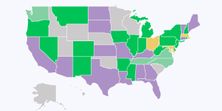Elections in Ohio, Kentucky, and Texas Could Hurt 2021 Sports Betting Hopes
Bob Levey/Getty Images. Pictured: The United States flag, State of Texas flag, and Texas A&M 12th Man flag.
Voters overwhelmingly supported gaming expansion in all six states that had gambling referendum questions on their respective 2020 ballots. Election results in several other states did not go as well for gambling hopes in 2021.
Statehouse elections In Ohio, Kentucky and Texas — three states where sports betting stakeholders hoped to make inroads toward legalization next year — all went the opposite direction. Most voters (obviously) considered multiple factors when voting for state-level lawmakers beyond just their gambling legislation position, but these votes nevertheless diminish legal sports betting bills’ prospects next year.
Here’s how these three states stand as the final 2020 voters are counted and what this means for sports betting in 2021.
Ohio Loses Sports Betting Sponsors
The Ohio House of Representatives already passed a sports betting bill, but it has lingered for months in the state Senate. After Tuesday’s election, it's about to lose its two biggest champions.
Sen. Sean O’Brien, one of the bill’s Senate sponsors, lost his re-election race. The other Senate sponsor, Sen. John Eklund, is term-limited from seeking office again. Rep. Dave Greenspan also lost his race, meaning three of the four sports betting legislation sponsors will not return for the 2021 session.
This leaves less than two months for the Senate to pass a bill, or a new group of backers will have to start over in 2021. Even though lawmakers from both chambers largely support legal wagering, there are still divisions over several key issues that continue to stall the legislation.
Ohio is one of just a handful of state legislature that meets year-round, giving sports betting hopes to pass before the end of the calendar year. A lame-duck session could jump-start negotiations, but time is running out; the full Senate is scheduled to meet no more than three times in November and seven in December.
In the meantime, the House bill hasn’t even been taken up by a Senate committee, an essential step in the legislative process.
Gov. Mike DeWine has largely supported sports betting, as have many of his fellow party members in the GOP-controlled legislature. Ohio elected officials have also watched neighboring states such as Illinois, Michigan and Pennsylvania continue to grow their respective wagering markets.
But what seemed like a good bet to pass in 2020 is looking less and less promising — and any legalization efforts in 2021 will have to come without three of the General Assembly’s biggest advocates.
Kentucky Sports Betting Hopes Slip
Kentucky seemed like it could be the first state to pass a sports betting bill in 2020 after it cleared a House committee vote unanimously. Nearly a year later, legal wagering seems further away than ever.
Democrats suffered heavy losses in the 2020 General Assembly elections, diminishing a voting block that had largely supported sports betting. Kentucky Republicans flipped at least 10 seats in the House of Representatives with more GOP wins possible as final votes are tabulated.
Republicans will likely have at least 72 seats in the 100-person House for the 2021 session and potentially as many as 75, furthering their hold on the lower house. Republicans were also expected to extend their supermajority lead in the Senate.
Though sports betting has been championed by Republican Rep. Adam Koenig, who easily won re-election, his fellow party members have largely resisted his proposals. Koenig said at an industry conference earlier this year there was majority support in the General Assembly for sports betting but not among Republicans. Without majority GOP support, Republican leadership will likely not take up a sports betting bill before the full House floor, no matter what support it gets in committee.
Fewer Democrats means it will be even harder to get that support, especially among a GOP caucus that features a block of members opposed to gambling in any form. Democratic Gov. Andy Beshear still supports legal wagering, clearing one possible hurdle, but this may actually hurt the legislation’s favorability among Republicans remiss to give the governor any political “wins.”
An enlarged majority may further embolden Republicans to push their own legislative agenda, which so far hasn’t included sports betting. Kentucky’s shortened odd-numbered year legislative calendar comes into play as well in 2021, further hindering what, a year ago, seemed like promising legislation.
Longshot Texas Sports Betting Prospects Diminished
Long odds for Texas sports betting only got longer last week.
Democrats had hoped to flip the Texas House of Representatives for the first time in decades. Instead, Republicans are projected to hold the chamber easily.
With that likely goes the best chances for legal sports betting in the nation’s second-most populated state.
Texan Republicans have largely resisted any new form of gambling, and Texas remains one of a dwindling number of states without commercial casinos. Even as holdouts such as Nebraska and Virginia approved casino gaming this year, there seems little political interest to follow suit in Texas — especially as long as Republicans control the legislature and governor’s mansion.
A Democratic House flip would not have guaranteed legal sports betting, but GOP control all but assures it won’t pass next year. Republican Gov. Greg Abbot has also largely opposed legal gambling, a logistical obstacle that could also influence legislators politically in his party.
Texas’ massive, growing population and deep-rooted sports obsession has industry stakeholders dreaming of what would be one of the most lucrative sports wagering markets in the world. But this year’s elections show gambling in Texas remains a difficult political hurdle.
Texas only holds regular legislative sessions in odd-numbered years, and after the 2020 elections, it seems sports betting won’t be approved until 2023 at the very earliest — and only then if political winds have shifted dramatically.
How would you rate this article?



